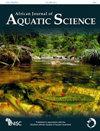淡水生物多样性信息系统(FBIS)——动员数据来评估南非河流的长期变化
IF 1
4区 环境科学与生态学
Q3 MARINE & FRESHWATER BIOLOGY
引用次数: 6
摘要
获取长期生物多样性数据集对于监测、管理和保护淡水生态系统至关重要。检测关键的生态系统变化,如失去独特的生物多样性和生态系统服务,取决于能否获得数据。南非河流生态系统拥有丰富的生物多样性数据,但目前还没有获取这些数据的操作信息系统。这一差距是管理淡水生物多样性数据的能力有限的结果,现有系统孤立、难以访问且维护不善。为了解决这一知识差距,开发了淡水生物多样性信息系统。FBIS是一个功能强大、可视化、数据丰富的信息系统,用于托管和服务淡水生物多样性数据。它是一个数据清查和维护平台,从而有助于评估河流生物多样性和生态系统状况的长期变化,并指导未来的监测战略和管理决策。主要最终用户群体的数据和报告需求为系统设计和功能提供了强有力的信息,包括水资源管理人员、生物多样性和保护管理人员和规划者、科学研究人员和环境顾问。未来的扩展旨在增加数据访问、数据流和地理覆盖范围的多样性,并将FBIS战略性地嵌入南非的主要淡水决策管道。本文章由计算机程序翻译,如有差异,请以英文原文为准。
The Freshwater Biodiversity Information System (FBIS) – mobilising data for evaluating long-term change in South African rivers
Access to long-term biodiversity datasets is vital for monitoring, managing and protecting freshwater ecosystems. Detecting critical ecosystem changes, such as losing unique biodiversity and ecosystem services, is dependent on access to data. A wealth of biodiversity data exists for river ecosystems in South Africa, but an operational information system to access these data is currently not available. This gap is the result of limited capacity for managing freshwater biodiversity data, with existing systems isolated, difficult to access and not well maintained. To address this knowledge gap, the Freshwater Biodiversity Information System (FBIS) has been developed. The FBIS is a powerful, visual, data-rich information system for hosting and serving freshwater biodiversity data. It serves as a platform for the inventory and maintenance of data, thereby facilitating the evaluation of long-term change in river biodiversity and ecosystem condition, and guiding future monitoring strategies and management decisions. System design and functionality was strongly informed by data and reporting needs of key end-user groups, including water resource managers, biodiversity and conservation managers and planners, scientific researchers, and environmental consultants. Future expansion aims to increase the diversity of data accessed, data flow, geographic coverage and strategically embed FBIS into South Africa’s main freshwater decision-making pipelines.
求助全文
通过发布文献求助,成功后即可免费获取论文全文。
去求助
来源期刊

African Journal of Aquatic Science
MARINE & FRESHWATER BIOLOGY-
CiteScore
3.90
自引率
7.10%
发文量
31
审稿时长
>12 weeks
期刊介绍:
The African Journal of Aquatic Science is an international journal devoted to the study of the aquatic sciences, covering all African inland and estuarine waters. The Journal publishes peer-reviewed original scientific papers and short articles in all the aquatic science fields including limnology, hydrobiology, ecology, conservation, biomonitoring, management, water quality, ecotoxicology, biological interactions, physical properties and human impacts on African aquatic systems.
 求助内容:
求助内容: 应助结果提醒方式:
应助结果提醒方式:


